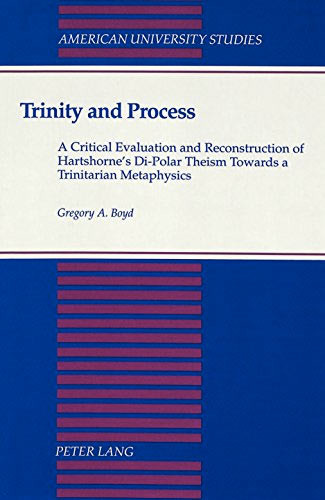Trinity and Process
A Critical Evaluation and Reconstruction of Hartshorne’s Di-Polar Theism Towards a Trinitarian Metaphysics (American University Studies Series VII, Theology and Religion)
 Author: Dr. Gregory A. Boyd
Author: Dr. Gregory A. Boyd
Publisher: Peter Lang (1992)
Topic: Philosopy/ Theology: What’s right, and wrong, with Process metaphysics from an orthodox Christian perspective?
Description: In this insightfully researched and tightly argued book, Dr. Gregory Boyd argues that there is much in Hartshorne’s process metaphysics that contributes to a Trinitarian metaphysics. But there is also a good deal that is clearly incompatible with any metaphysical scheme that would want to stay within the bounds of “orthodox” Christianity. Boyd argues the positive contributions can be retained and the incompatible features avoided by simply correcting a few mistakes Hartshorne makes at the foundation of his metaphysical enterprise. The result is a metaphysical system that is rooted in an orthodox view of the Trinity but that loses none of the explanatory power of Hartshorne’s dynamic, non-substantival metaphysics.
Greg’s story behind the writing of Trinity and Process: This is basically my Princeton Doctoral dissertation. I was originally going to write a dissertation comparing Jonathan Edward’s “dispositional ontology” with the metaphysics of Alfred North Whitehead (in Process and Reality). They really do have much in common (this always shocks people, for Edwards was a Calvinist, while Whitehead’s process metaphysics is centered on indeterminism). But as I studied Whitehead I stumbled onto the writings of Charles Hartshorne whom I frankly found to be a clearer and more insightful thinker than Whitehead (though Hartshorne is usually — and mistakenly — portrayed as a disciple of Whitehead). So I decided to compare Hartshorne and Edwards. Unfortunately, as I wrote my dissertation, my own critical interactions with Hartshorne became so extensive I had no room for Edwards (I had already exceeded my page limit). So I made the whole dissertation about Hartshorne and just threw my Edwards material into the last chapter.
I’ve always planned on getting back to Edwards in order to develop my own “dispositional ontology ” using his thought as a spring board. But other projects keep getting in the way! Someday perhaps.
